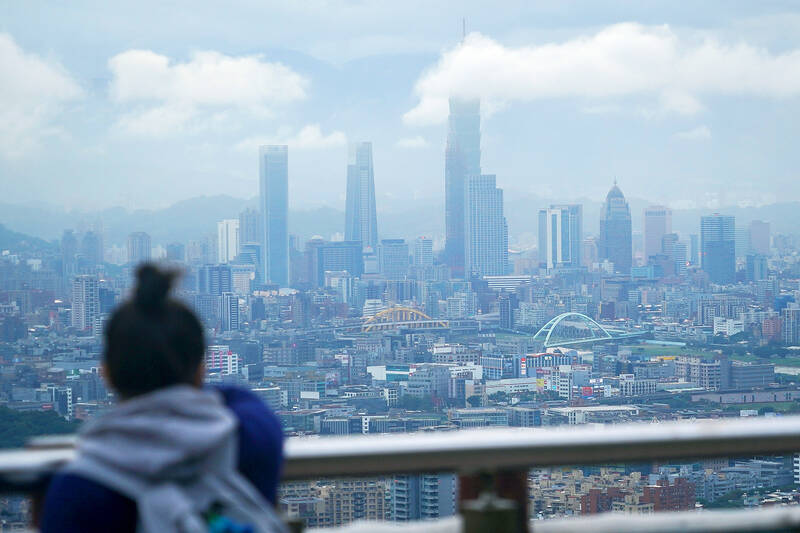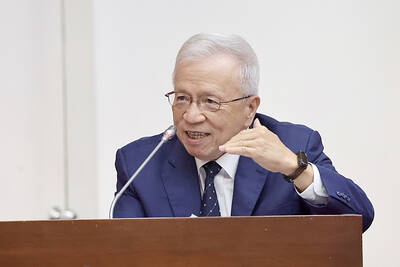Changes to the Equalization of Land Rights Act (平均地權條例) might trigger panic selling of presale house purchase agreements and weigh on overall property deals, real-estate analysts said yesterday.
The amendments, which cleared the legislature yesterday morning, would ban transfers of presale house purchase agreements and require legal entities to obtain permission from their respective governing authority before buying a residential unit.
Evertrust Rehouse Co (永慶房屋) said the legislation in essence limits presale housing projects to buyers with real demand and puts an end to people profiting from reselling purchase agreements that cost relatively little.

Photo: CNA
“The revisions aim to stem short-term property speculation for presale and existing housing, which would help make house prices in Taiwan more reasonable,” Evertrust Rehouse deputy research head Chen Chin-ping (陳金萍) said, adding that unaffordable housing has ranked the No. 1 public complaint over past few years, especially among young people.
Investment-minded holders of presale house contracts would opt out and take a loss if necessary, as some would not have the financial means to absorb the mortgage burdens, Evertrust Rehouse said.
The legislation should succeed in calming house price increase expectations and prevent a bubble from forming, the broker said.
Sinyi Realty Inc (信義房屋) said the requirement that legal entities gain approval before buying real estate would slow luxury house transactions and dampen capital repatriation.
Some people have channeled money from abroad to buy luxury houses in Taiwan to dodge stiff income taxes abroad, while others have used upscale housing to protect themselves from inflation, Sinyi said.
The amendments could discourage such practices, which noticeably cooled last year due to interest rate hikes, unfavorable tax terms and other headwinds, Sinyi said.
H&B Realty Co (住商不動產) said that the slowdown in the local housing market has to do with the amendments being proposed in July last year.
Investors have since fled the market, although they were hoping the government might back off, H&B research manager Jessica Hsu (徐佳馨) said.
“Panic selling looks inevitable and might cause a splash,” Hsu said.
However, it is too early to tell if there would be evident housing price corrections, she said.
Rather, the requirement to gain permission might discourage urban renewal projects, Hsu added.
SEE LAWMAKERS ON PAGE 1

JITTERS: Nexperia has a 20 percent market share for chips powering simpler features such as window controls, and changing supply chains could take years European carmakers are looking into ways to scratch components made with parts from China, spooked by deepening geopolitical spats playing out through chipmaker Nexperia BV and Beijing’s export controls on rare earths. To protect operations from trade ructions, several automakers are pushing major suppliers to find permanent alternatives to Chinese semiconductors, people familiar with the matter said. The industry is considering broader changes to its supply chain to adapt to shifting geopolitics, Europe’s main suppliers lobby CLEPA head Matthias Zink said. “We had some indications already — questions like: ‘How can you supply me without this dependency on China?’” Zink, who also

At least US$50 million for the freedom of an Emirati sheikh: That is the king’s ransom paid two weeks ago to militants linked to al-Qaeda who are pushing to topple the Malian government and impose Islamic law. Alongside a crippling fuel blockade, the Group for the Support of Islam and Muslims (JNIM) has made kidnapping wealthy foreigners for a ransom a pillar of its strategy of “economic jihad.” Its goal: Oust the junta, which has struggled to contain Mali’s decade-long insurgency since taking power following back-to-back coups in 2020 and 2021, by scaring away investors and paralyzing the west African country’s economy.

BUST FEARS: While a KMT legislator asked if an AI bubble could affect Taiwan, the DGBAS minister said the sector appears on track to continue growing The local property market has cooled down moderately following a series of credit control measures designed to contain speculation, the central bank said yesterday, while remaining tight-lipped about potential rule relaxations. Lawmakers in a meeting of the legislature’s Finance Committee voiced concerns to central bank officials that the credit control measures have adversely affected the government’s tax income and small and medium-sized property developers, with limited positive effects. Housing prices have been climbing since 2016, even when the central bank imposed its first set of control measures in 2020, Chinese Nationalist Party (KMT) Legislator Lo Ting-wei (羅廷瑋) said. “Since the second half of

AI BOOST: Next year, the cloud and networking product business is expected to remain a key revenue pillar for the company, Hon Hai chairman Young Liu said Manufacturing giant Hon Hai Precision Industry Co (鴻海精密) yesterday posted its best third-quarter profit in the company’s history, backed by strong demand for artificial intelligence (AI) servers. Net profit expanded 17 percent annually to NT$57.67 billion (US$1.86 billion) from NT$44.36 billion, the company said. On a quarterly basis, net profit soared 30 percent from NT$44.36 billion, it said. Hon Hai, which is Apple Inc’s primary iPhone assembler and makes servers powered by Nvidia Corp’s AI accelerators, said earnings per share expanded to NT$4.15 from NT$3.55 a year earlier and NT$3.19 in the second quarter. Gross margin improved to 6.35 percent,